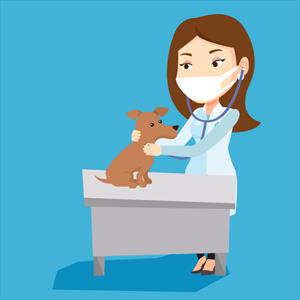It was one thing to give the job 110% when the pandemic started and we were all in this together
Veterinarian examing dog illustration

Illustration courtesy of Depositphotos
It's a common problem right now: clients lamenting the delays in getting care for their pets. Where have all the veterinarians gone? Why can't I get in for Fluffy's annual exam this week instead of next month? Why is there an 8-hour wait at the emergency clinic? What's going on???
The answer: the pandemic.
Shocking, I know. The veterinary field was badly impacted at the beginning and it continues to reel 18 months later. Right now, whether it is true or not, it feels like every veterinary clinic is desperate for more veterinarians, more veterinary technicians, and more staff. (Part of the irony here is that 12 years ago, the question being asked was why do we have a surplus of veterinarians?) Like many things COVID-related, it's been a mix of factors that bring us to the current predicament.
At the beginning of the pandemic, one blessing was that many shelters were able to empty themselves of all adoptable pets. Those that weren't yet adoptable may still have gone into foster homes. Those who didn't get their pets at shelters may have found them from breeders, Craig's list, or the guy with the box of kittens in the grocery store parking lot. Suddenly, many people had a new furry friend in their lives, and all those furry friends needed vaccines and other standard care. Plus, people were home more. A lot more. Were there any issues that had been noticed previously but ignored because of a lack of time? Now there was plenty of time! Additionally, some folks were really looking at their pets more than they had before the pandemic, and noticing the concerning behaviors, little skin masses, or whatever else gave them pause. Whatever the reason, demand for veterinary services took off.
During the pandemic's early days in particular, personal protective equipment like masks and gloves were scarce. Veterinarians, like physicians, stopped doing anything resembling an elective surgery. This meant many fewer spays and neuters were being done, so likely there were more puppies and kittens born in 2020 than in the years leading up to it, although I don't know if anyone has the data to confirm that theory.
At the same time, veterinary clinics were being forced to see clients curbside and patients inside. The client would park, call the clinic on their cell phone, and a staff member would go out to get the pet and ask about the reason for the pet's visit. That staff member would take the pet inside, which sometimes was an extraordinary effort in-and-of itself when dealing with a Mastiff that doesn't walk well on a leash. The veterinarian would do the examination, then call the owner for more details as to the issues at home and to discuss the findings from the exam. Permission may be needed for testing. Estimates had to be made and approved. Payments had to take place, sometimes over the phone and sometimes involving a back-and-forth trip inside to handle checks or cash. The pet had to be returned to the car with their medications. All of this was done while changing gloves, wearing masks, and maybe gowns, and dealing with new technology to allow for video conferencing and increased phone calls. Efficiency dropped, so fewer patients could be seen in a day without extending hours. Which many clinics did, in the hopes that we'd be back to a completely normal existence by now. Which we're not.
Of course, like everyone else, veterinarians and their staff have been dealing directly with COVID. Many people, including veterinarians and staff, have had it and some have died. The inequity seen in how the pandemic affected employed women vs. employed men overall meant that in this female-dominated profession, more female staff stayed home to take care of sick family and kids who could no longer go to school. With daily staff shortages, fewer appointments could be scheduled. Some folks who were near retirement age anyway understandably saw this as a good time to leave the profession altogether. At times, clinics had to close because of quarantines or not enough staff.
Today, many veterinary clinics are simply dealing with burnout. Their veterinarians and staff members have been working too hard, too long, without a break. They keep having supply issues such as a shortage of ivermectin because so many people erroneously believe it will help them recover from COVID. Several veterinarians and staff members have quit, or worse, committed suicide. It was one thing to give the job 110% when the pandemic first started and we were all in this together, but we're over 18 months into this, the politics over something medical are draining, and folks just need a break.
My best advice to pet owners is to do as much preventative care as possible. This is always a good plan but is really imperative right now. If your dog will need vaccines and heartworm preventative in two or three months, call now to make the appointment. If your cat seems off this morning after vomiting twice overnight, don't wait to seek care. Call your regular clinic, other clinics in the area, or the emergency clinic immediately. And remember that veterinarians and their staff are human. They get tired, they worry about sick family members and friends, and they too, like to see kind eyes when smiles are hidden under a mask. Be patient with them. Show your appreciation by bringing cards, food, or other gifts. If you're heading to the emergency clinic, bring some snacks and entertainment for yourself as the wait may be longer than it was pre-pandemic. At a minimum, say a heartfelt “thank you” for the care the veterinary team has shown you and your pet. Hopefully soon, we'll reach an easier “new normal."